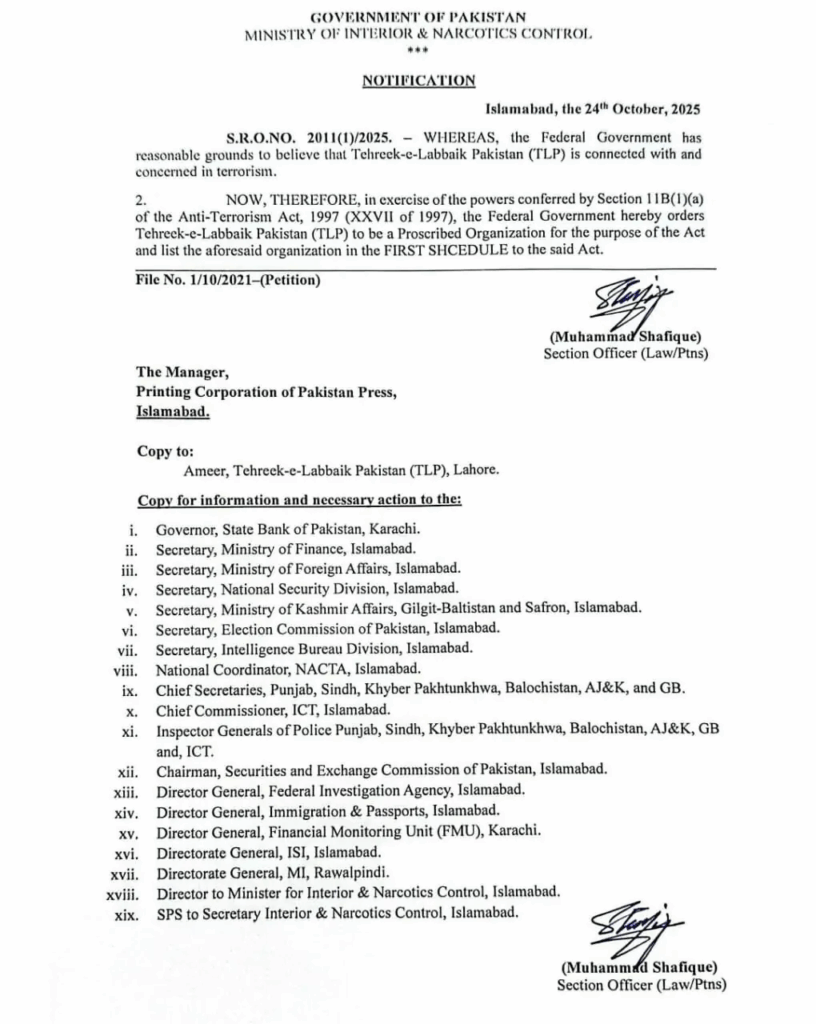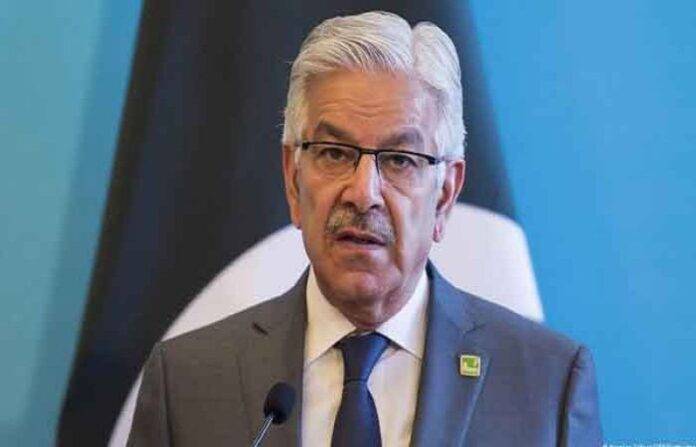PTBP Web Desk
The Interior Ministry of Pakistan has officially banned the Tehreek-e-Labbaik Pakistan (TLP), classifying it as a proscribed organization under the Anti-Terrorism Act, 1997. The notification issued on Friday stated that the federal government had “reasonable grounds to believe” that TLP was connected to activities involving terrorism and public disorder.

According to the official notification, “The federal government has reasonable grounds to believe that TLP is connected with and concerned in terrorism. In exercise of the powers conferred by Section 11B(1)(a) of the Anti-Terrorism Act, 1997, the federal government hereby orders TLP to be a proscribed organization and lists it in the First Schedule of the Act.”
This decision follows growing concerns over the party’s role in inciting violence, disrupting law and order, and promoting extremist narratives in Pakistan’s urban centers.
The federal cabinet endorsed the decision to ban the group on Thursday, following a formal request by the Punjab government. A detailed summary from the Ministry of Interior was presented to the cabinet for consideration.
According to an announcement from the Prime Minister’s Office (PMO), the summary was unanimously approved by the cabinet, reflecting a consensus across government institutions on the need to counter violent extremism.
Officials briefed the cabinet about TLP’s past involvement in violent protests, road blockades, and acts of vandalism, which have caused significant economic losses and disruption to daily life.
Founded in 2016 by Khadim Hussain Rizvi, the TLP emerged as a religious-political movement with a hardline stance on Pakistan’s blasphemy laws. Over the years, the group gained massive street power by mobilizing supporters on religious sentiments, often leading to violent standoffs with law enforcement agencies.
Under the leadership of Saad Hussain Rizvi, son of the late founder, the TLP expanded its organizational network across Punjab and Sindh. The group became notorious for paralyzing major cities through sit-ins and confrontations with security forces whenever its demands were not met.
Despite its controversial reputation, TLP’s political performance in the 2024 general elections surprised analysts. The party emerged as the third-largest in Punjab, securing nearly 2.9 million votes, signaling its deep-rooted support among segments of the population.
However, as TLP’s political influence grew, so did its involvement in violent demonstrations. Earlier this month, several deadly clashes between party supporters and law enforcement agencies were reported, further prompting the government to take decisive action.
In the detailed notification, the Interior Ministry emphasized that the decision to proscribe TLP was based on national security concerns and in accordance with Pakistan’s legal framework on counterterrorism.
Officials noted that repeated instances of violence, hate speech, and the group’s ability to mobilize large crowds through inflammatory rhetoric posed a direct threat to public safety and internal stability.
A senior ministry official, while speaking to a local publication, said that the government’s move aligns with its broader strategy to curb extremist ideologies and maintain law and order.
“The ban on TLP reflects the state’s zero-tolerance policy towards groups involved in violent extremism, regardless of their political or religious backgrounds,” the official added.
The proscription of TLP marks a significant development in Pakistan’s ongoing battle against extremism. The party’s mass following, particularly among lower-income and religiously motivated voters, presents both a challenge and an opportunity for the government.
Analysts suggest that while the ban may temporarily reduce street violence, it could also push the group’s supporters underground, making enforcement more complex.
Furthermore, the move underscores the government’s resolve to implement the National Action Plan (NAP) and enforce the Anti-Terrorism Act uniformly across all political and religious groups.
The decision to ban TLP has drawn attention from international observers who have been closely monitoring Pakistan’s counterterrorism policies. The country has faced global scrutiny in the past for its handling of extremist organizations.
Observers have noted that banning TLP could improve Pakistan’s image in global forums and reinforce its commitment to countering religious extremism.
However, some human rights groups have cautioned against excessive crackdowns, urging the government to balance security enforcement with political engagement to prevent alienation among citizens.
With the ban now in place, TLP’s assets are expected to be frozen, and its activities monitored by security and intelligence agencies. The party’s offices, rallies, and public gatherings will be restricted under the provisions of the Anti-Terrorism Act.
The Punjab Home Department and law enforcement agencies have been instructed to implement the proscription immediately and prevent any attempt by TLP to reorganize under a new name.
Experts believe that the coming weeks will be crucial in determining how effectively the ban is enforced and whether it will deter other groups from engaging in similar activities.




